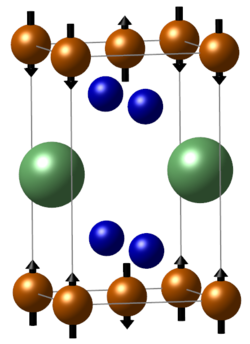Thermoelectricity in Manganese Pnictides (FWF)

In times of a drastic increase in energy consumption alternative sources of electric energy become increasingly important. Thermoelectric materials can intrinsically convert heat into electric energy, and therefore they are often considered as an alternative source of power generation. Otherwise wasted heat, e.g. from car engines or power plants, can be utilized in an environmentally friendly way. The fact that the power conversion through the Seebeck effect is essentially a material property opens the possibility of designing reliable, maintenance-free and long-living devices. Studying the underlying microscopic mechanisms that promote high thermoelectricity is a pivotal aspect not only in the search of new thermoelectric materials, but also in view of tuning and improving existing ones by targeted structural modifications, e.g. chemical substitution, external deformation or even heterostructure design.
The main objective of this project is a deeper understanding of the thermoelectric properties of manganese-based compounds that crystallize in the same structure as the iron-based pnictide superconductors and are, hence, qualitatively distinct from the better known manganese perovskites. Here, lacking large crystal-field splitting as compared to perovskites, the multi-orbital physics is qualitatively different. LaOMnAs for example, doped with charge carriers, shows an enormous Seebeck effect of 0.24 mV/K. Further estimates give power factors that are as high or even higher than for thermoelectric semiconductors. Understanding the magnetic ground state in those systems is also of big importance, because they determine largely the Fermi surface. There are lots of open questions, in particular why systems like LaOMnAs and BaMn2As2 show different magnetic ordering patterns and why the ordering temperatures differ by a factor of two.
This project is funded by the FWF under project number P26220.

Project Staff
Published peer-reviewed papers
2019
Thermopower of the electron-doped manganese pnictide LaMnAsO
Publikation in PURE anzeigen
2018
Dynamical mean-field theory on the real-frequency axis: p-d hybridization and atomic physics in SrMnO3
Publikation in PURE anzeigen
2017
Fork tensor-product states
Publikation in PURE anzeigen
Maximum entropy formalism for the analytic continuation of matrix-valued Green’s functions
Publikation in PURE anzeigen
2016
Importance of effective dimensionality in manganese pnictides
Publikation in PURE anzeigen
TRIQS/DFTTools: A TRIQS application for ab initio calculations of correlated materials
Publikation in PURE anzeigen
2015
La2O3Fe2Se2: A Mott insulator on the brink of orbital-selective metallization
Publikation in PURE anzeigen
Relevant Publications
Thermopower of the electron-doped manganese pnictide LaMnAsO
M. J. Zingl, G. J. Kraberger, and M.Aichhorn
Importance of effective dimensionality in manganese pnictides
M. J. Zingl, E. Assmann, P. Seth, I. Krivenko, and M. Aichhorn
Fork Tensor Product States - Efficient Three Orbital Real Time DMFT Solver
Daniel Bauernfeind, Manuel Zingl, Robert Triebl, Markus Aichhorn, Hans Gerd Evertz
TRIQS/DFTTools: A TRIQS application for ab initio calculations of correlated materials
Markus Aichhorn, Leonid Pourovskii, Priyanka Seth, Veronica Vildosola, Manuel Zingl, Oleg E. Peil, Xiaoyu Deng, Jernej Mravlje, Gernot J. Kraberger, Cyril Martins, Michel Ferrero, and Olivier Parcollet